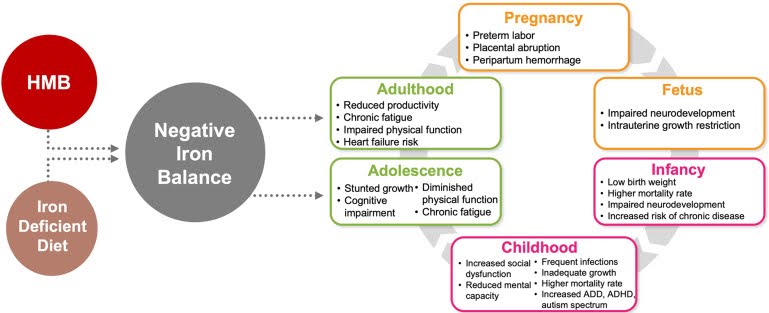
Why does iron deficiency cause heavy periods?
You read that right.
But do we ever wish it were wrong.
Heavy menstrual bleeding (or HMB for short) is not just a consequence, but also a cause of iron deficiency.
The vicious cycle
We often tell patients that when we correct their iron deficiency it can often reduce the amount they bleed with each period. We’re usually met with bewilderment.
Most of the shock in our patient’s faces comes from a disbelief that life would do them so wrong, and some of the shock comes from their anemia.
Why does losing iron make us lose... even more iron?
In a double-blind placebo study, 75% of patients receiving iron described improvement in their heavy menstrual bleeding, as opposed to just 32.5% of the placebo group.
Here are the two main reasons why:
- iron is necessary for making platelets, the sticky little guys that seal our wounds
- iron is also part of the process that constricts blood vessels, slowing the amount of period flow.
The less iron you have, the fewer stickies, and more flow.
Less stickies, more flow… there goes even more of your iron.
Don't get yourself trapped
In a strange twist, many women actively avoid iron supplementation during menstruation because of the false belief that taking iron during the period increases the amount of bleeding.
Au contraire ma soeur, taking iron during a period is either neutral or even reduces the amount of bleeding.
Our bodies want to absorb more iron during menstruation, so it’s a perfect time to take advantage of that. Iron absorption can double or even triple during a bleed, from our usual 1mg up to as high as 3mg per day!
This plays out in real life too. At Gravity Health, we have countless patients, who after normalizing their iron levels, report significantly reduced bleeding with their periods.
So it’s a cycle that can be broken.

The next move is yours
Time to make the menstrual cycle a little less of a vicious one.
Test your ferritin, take your iron and hold onto your precious blood.
And let us know if you’re thinking an IV could help.










